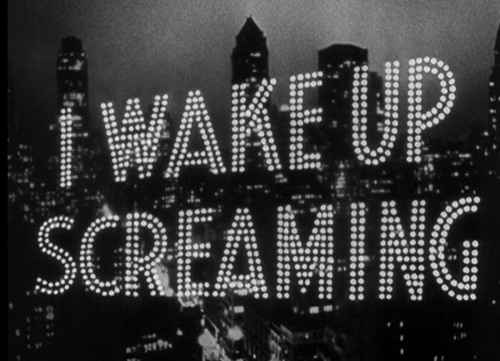 I Wake Up Screaming/1941/Twentieth Century-Fox/82 min.
I Wake Up Screaming/1941/Twentieth Century-Fox/82 min.
In the Neglected Works of Noir department, “I Wake Up Screaming” from 1941 is just crying out for attention.
Director H. Bruce Humberstone made a fun and taut whodunit that’s also a treat for the eyes. The film stars Betty Grable (singer, dancer and pin-up legend in her first dramatic role) and Carole Landis as sisters Jill and Vicky Lynn, who quickly shed their homespun sensibilities as they fend for themselves in New York City, Jill working as a stenographer and Vicky waiting tables.
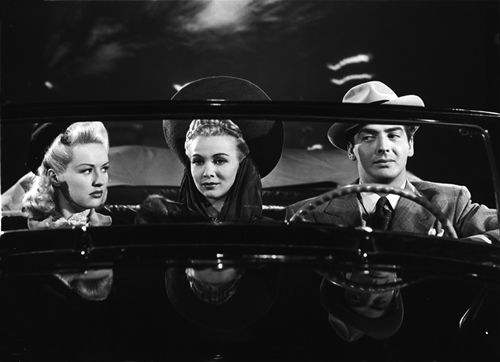 Naturally, it’s only a matter of time before the fine-boned fair-haired creatures are discovered. Vicky’s in the spotlight first after PR guru Frankie “Botticelli” Christopher (Victor Mature) stops into the diner one night with some friends and decides, as he puts it, to make her The Next Big Thing. (At one point, Frankie asks how expensive she is; she replies he couldn’t afford her. To circumvent censors, that risqué line was reportedly added while shooting.)
Naturally, it’s only a matter of time before the fine-boned fair-haired creatures are discovered. Vicky’s in the spotlight first after PR guru Frankie “Botticelli” Christopher (Victor Mature) stops into the diner one night with some friends and decides, as he puts it, to make her The Next Big Thing. (At one point, Frankie asks how expensive she is; she replies he couldn’t afford her. To circumvent censors, that risqué line was reportedly added while shooting.)
Frankie’s pals Jerry (William Gargan), Robin (Alan Mowbray) and Larry (Allyn Joslyn) also jockey for her attention and lend their support to her quest to be a model/actress. But, just as she’s about to jet off to Hollywood for a screen test, Vicky is murdered, and all her pals are under suspicion as is the creepy clerk at her apartment building, Harry, played by noir great Elisha Cook Jr.
Matching Cook’s seediness is hefty Police Insp. Ed Cornell (Laird Cregar). Cregar caught critics’ attention with his dark, skulking, mysterious presence; his name is probably a hat-tip to writer Cornell Woolrich.
Also, look out for “Black Mask,” the famous pulp magazine, for sale on a newsstand.
As the story unfolds, a romance develops between Frankie Christopher and Jill, and the movie proceeds at a nice clip, clocking in at 82 minutes. “I Wake Up Screaming” makes significant strides in noir style and technique, though it rarely gets credit for its achievements. One of the films that eclipsed it was director John Huston’s mightily famous “The Maltese Falcon,” also from 1941. A big-budget release from Warner Bros., the now classic movie is often cited as the first film noir.
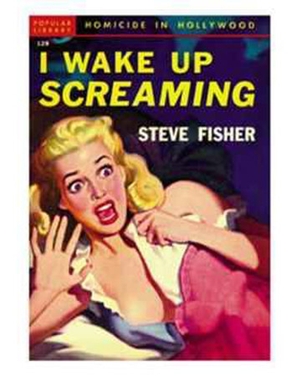 “I Wake Up Screaming,” a much smaller project than “Falcon,” was the first film noir made at Twentieth Century-Fox. Humberstone incorporated arresting compositions and lighting – note the dramatic, single-source lighting in the police interrogation room scenes. The scene in which Cornell pays Christopher a night-time visit virtually defines noir, with its exaggerated shadows, grim faces, a black cat and a neon sign in the distance. Edward Cronjager was director of photography. Noir czar and author Eddie Muller points out in his excellent DVD commentary that, in visual terms, “The Maltese Falcon” is pedestrian compared with the creativity in “I Wake Up Screaming.”
“I Wake Up Screaming,” a much smaller project than “Falcon,” was the first film noir made at Twentieth Century-Fox. Humberstone incorporated arresting compositions and lighting – note the dramatic, single-source lighting in the police interrogation room scenes. The scene in which Cornell pays Christopher a night-time visit virtually defines noir, with its exaggerated shadows, grim faces, a black cat and a neon sign in the distance. Edward Cronjager was director of photography. Noir czar and author Eddie Muller points out in his excellent DVD commentary that, in visual terms, “The Maltese Falcon” is pedestrian compared with the creativity in “I Wake Up Screaming.”
Additionally, scriptwriter Dwight Taylor conceived the story as a series of flashbacks – a hallmark of film noir storytelling – though Steve Fisher’s pulpy novel is not structured that way. And, long before it became common for actors, Cregar hung out with L.A. police to lend realism to his performance. The score is interesting too – featuring “Over the Rainbow” as well as “Manhattan Street Scene,” which was also used in “The Dark Corner.” (“I Wake Up Screaming” was remade in 1953 as “Vicki,” starring Jeanne Crain, Jean Peters and Elliott Reid; it was directed by Harry Horner.)
So why did “Screaming” get such short shrift? Well, it wasn’t a prestige picture and, while Humberstone made the best of this low-budget B movie, it’s tough to compete with John Huston, one of Hollywood’s finest talents ever. Also, “I Wake Up Screaming” contains a generous dollop of fluffy romantic comedy, which pairs a bit uneasily with the sly, wry humor and cynical entanglements of film noir at its grittiest. Btw, I love the scene where Frankie and Jill take a dip in a public pool – both flaunting their great shape, of course – Frankie puffing away merrily on a cigarette.
I don’t think I’m spoiling anything by saying that “I Wake Up Screaming” has a happy ending. Sadly, though, two of its actors died not long after the movie was released. In 1944, Cregar’s promising career was cut short at age 30 when the Philly-born actor had a heart attack, likely spurred by crash dieting for a part. Four years later, Wisconsin native Carole Landis, 29, died of a drug overdose. Her career had dead-ended and she was in bad shape, having been dismissed by the industry as a pretty airhead.
Unfortunately, that’s a story that’s been told and retold in Hollywood.
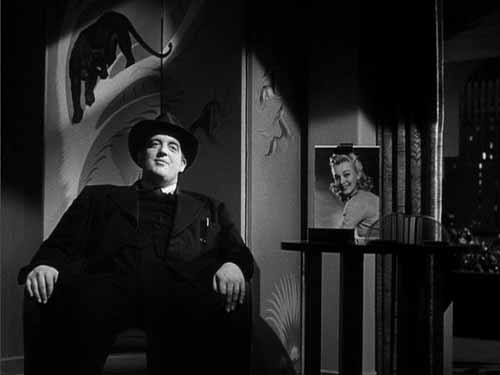
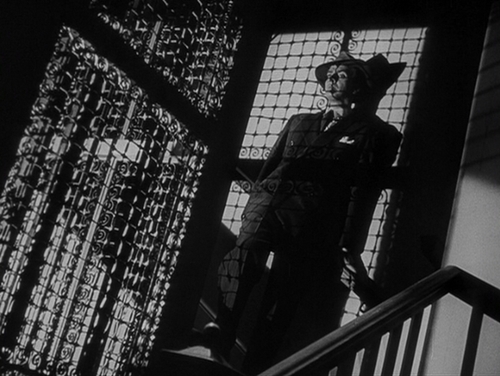










From FNB readers